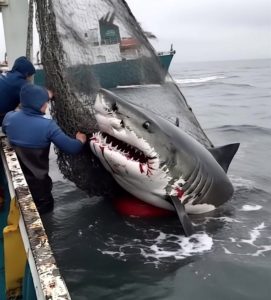Off the coast of South Africa, a team of marine biologists raced to save a great white shark entangled in discarded fishing nets. Reported by a local fisherman, the shark was growing weaker by the hour. Dr. Emily Carter, an expert in shark behavior, led the urgent rescue.
As their boat neared the shark, tension filled the air. The massive creature—nearly four meters long—was barely moving, its body marked by deep cuts from the nets. The team launched a dinghy and approached cautiously, using cutters to free the animal strand by strand.
The shark, surprisingly still, seemed to sense their intent. Just as they freed the final piece of net, it thrashed violently, nearly capsizing the boat. But then, it paused—and instead of fleeing, circled the dinghy slowly, almost as if to say thank you.

Back on the vessel, relief turned into celebration. For Dr. Carter and her team, it was more than a successful rescue. It was a moment of connection—a reminder of the fragile bond between humans and the wild, and the beauty that can come from compassion.